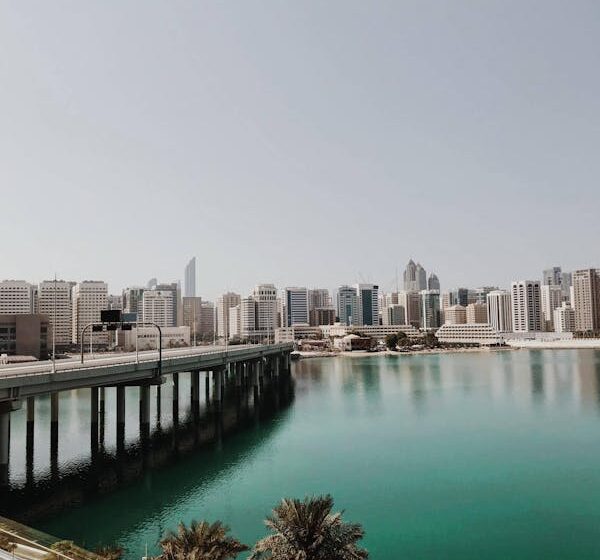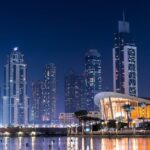The Industrial City of Abu Dhabi (ICAD) is one of the most significant industrial zones in the United Arab Emirates. Strategically located within the Abu Dhabi Emirate, ICAD has been designed to support the country’s economic diversification by boosting manufacturing, logistics, and heavy industry. As part of the government’s long-term vision, the Industrial City of Abu Dhabi plays a central role in attracting foreign investments, creating jobs, and positioning the UAE as a global industrial powerhouse.
This article explores the development, infrastructure, business benefits, and future outlook of the Industrial City of Abu Dhabi.
Strategic Location and Connectivity
The Industrial City of Abu Dhabi is located in Mussafah, approximately 30 kilometers from the city center of Abu Dhabi. Its proximity to key transport hubs makes it ideal for logistics and trade.
-
Close to major highways: Direct access to E30 and E11 highways
-
Near Abu Dhabi Port (Khalifa Port): One of the region’s most advanced deep-sea ports
-
Near Abu Dhabi International Airport: Facilitates air freight and cargo transport
-
Rail-ready: Positioned to benefit from the Etihad Rail project
ICAD’s strategic location ensures seamless transport of goods across the UAE and to international markets.
Divisions of ICAD
The Industrial City of Abu Dhabi is divided into multiple specialized zones, each designed to cater to specific industries:
-
ICAD I
-
Heavy industries: Steel, metal, construction materials
-
Wide roads and large plots for mega projects
-
-
ICAD II
-
Medium and light manufacturing: Automotive, plastics, engineering
-
Ideal for logistics companies and suppliers
-
-
ICAD III
-
High-tech and clean industries: Electronics, renewable energy, ICT
-
Focus on sustainability and innovation
-
-
ICAD IV and V (Under development)
-
Future expansions to accommodate demand
-
This zoning structure allows businesses to operate in environments tailored to their operational and regulatory needs.
Infrastructure and Facilities
One of ICAD’s major attractions is its state-of-the-art infrastructure:
-
Utilities: 24/7 power, water, gas, and cooling services
-
Telecommunications: Fiber-optic internet and advanced telecom networks
-
Warehousing: Ready-built and customizable storage solutions
-
Labor accommodations: On-site housing facilities for workers
-
Security and waste management: Comprehensive services provided on-site
ICAD offers a plug-and-play industrial environment that reduces setup time and operational friction for new companies.
Key Industries and Tenants
Many of the UAE’s leading manufacturers and international firms have set up operations in the Industrial City of Abu Dhabi. The zone supports a wide range of sectors:
-
Steel and Metal Fabrication: Emirates Steel, Al Jaber Group
-
Automotive: Vehicle assembly and parts manufacturing
-
Construction Materials: Cement, precast concrete, glass production
-
Oil and Gas Support Services: Pipeline equipment, safety gear
-
Electronics and ICT: Printed circuit boards, sensors, cables
By concentrating industry leaders in one place, ICAD fosters synergy and collaboration across sectors.
Economic Impact and Employment
ICAD has played a major role in diversifying Abu Dhabi’s economy. Historically reliant on oil and gas, the Emirate is now actively investing in non-oil sectors.
-
Thousands of jobs created across various skill levels
-
Support for SMEs and large enterprises through incentives and industrial financing
-
Increased exports from the non-oil manufacturing sector
By creating a robust manufacturing base, the Industrial City of Abu Dhabi enhances the Emirate’s resilience to global market fluctuations.
Business Benefits and Incentives
Companies that choose to set up in ICAD enjoy numerous benefits:
-
100% foreign ownership under new UAE commercial laws
-
No personal income tax
-
Low corporate tax rates
-
Customs exemptions on equipment and raw materials (in some cases)
-
Proximity to markets in Asia, Africa, and Europe
Additionally, support from government bodies such as the Abu Dhabi Department of Economic Development (ADDED) and Khalifa Industrial Zone (KIZAD) helps streamline the business setup process.
Sustainability and Innovation
ICAD is aligning itself with Abu Dhabi’s sustainability goals:
-
Environmental standards: Green building codes and emission controls
-
Clean energy initiatives: Solar and energy-efficient manufacturing projects
-
Innovation hubs: Support for R&D and technology development
With the UAE’s commitment to Net Zero by 2050, the Industrial City is adopting clean industrial practices and attracting environmentally responsible businesses.
Future Outlook
As Abu Dhabi continues to develop its industrial sector, ICAD is expected to expand significantly. Here are some future trends:
-
Integration with Etihad Rail: Enhancing goods transport across the GCC
-
AI and Robotics: Boosting automation in manufacturing
-
Industry 4.0: Adoption of smart technologies in production lines
-
Global Trade Agreements: UAE’s increasing number of trade deals will benefit ICAD-based exporters
The city is poised to become one of the most advanced industrial clusters in the Middle East.
Challenges and Solutions
While ICAD offers vast opportunities, it also faces some challenges:
-
Competition with other free zones: Like JAFZA in Dubai or RAKEZ in Ras Al Khaimah
Solution: ICAD offers deeper industrial focus and larger spaces for heavy industry. -
Skilled labor shortages in specific technical areas
Solution: Training programs and partnerships with technical institutes are being promoted. -
Environmental concerns in heavy industries
Solution: Enforced regulations and clean technology adoption are prioritized.
The Abu Dhabi government continues to address these challenges through policy and infrastructure improvements.
Final Thoughts
The Industrial City of Abu Dhabi is more than just a collection of factories—it’s a symbol of the UAE’s forward-thinking approach to economic development. With world-class infrastructure, favorable investment policies, and a focus on innovation and sustainability, ICAD is attracting both local and international businesses eager to be part of the region’s industrial transformation.
Whether you’re a startup in engineering, a global manufacturer, or an investor looking for high-growth sectors, ICAD offers a powerful platform to grow and succeed in the heart of the Middle East.



